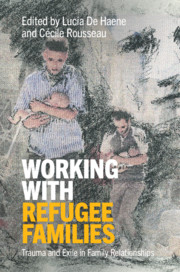Book contents
- Working with Refugee Families
- Working with Refugee Families
- Copyright page
- Dedication
- Contents
- Contributors
- Foreword
- Acknowledgments
- Introduction
- Part I Refugee Family Relationships
- Part II Trauma Care for Refugee Families
- Chapter 7 Mobilizing Resources in Multifamily Groups
- Chapter 8 Working through Trauma and Restoring Security in Refugee Parent-Child Relationships
- Chapter 9 Trauma Narration in Family Therapy with Refugees
- Chapter 10 Exile and Belonging
- Chapter 11 Working with Spirituality in Refugee Care
- Chapter 12 Collaborating with Refugee Families on Dynamics of Intra-family Violence
- Chapter 13 Supporting Refugee Family Reunification in Exile
- Chapter 14 Diagnosis as Advocacy
- Chapter 15 Reflexivity in the Everyday Lives and Work of Refugees and Therapists
- Part III Intersectoral Psychosocial Interventions in Working with Refugee Families
- Conclusion
- Index
- References
Chapter 7 - Mobilizing Resources in Multifamily Groups
from Part II - Trauma Care for Refugee Families
Published online by Cambridge University Press: 21 August 2020
- Working with Refugee Families
- Working with Refugee Families
- Copyright page
- Dedication
- Contents
- Contributors
- Foreword
- Acknowledgments
- Introduction
- Part I Refugee Family Relationships
- Part II Trauma Care for Refugee Families
- Chapter 7 Mobilizing Resources in Multifamily Groups
- Chapter 8 Working through Trauma and Restoring Security in Refugee Parent-Child Relationships
- Chapter 9 Trauma Narration in Family Therapy with Refugees
- Chapter 10 Exile and Belonging
- Chapter 11 Working with Spirituality in Refugee Care
- Chapter 12 Collaborating with Refugee Families on Dynamics of Intra-family Violence
- Chapter 13 Supporting Refugee Family Reunification in Exile
- Chapter 14 Diagnosis as Advocacy
- Chapter 15 Reflexivity in the Everyday Lives and Work of Refugees and Therapists
- Part III Intersectoral Psychosocial Interventions in Working with Refugee Families
- Conclusion
- Index
- References
Summary
“Multifamily groups have been used as therapeutic as well as preventive strategies to foster family adjustment in the aftermath of cumulative stressors related to a sequence of violence and war, migration and resettlement. In this chapter, the challenges refugee families face in host countries are described. Familial relationships have changed in response to disruption, the coping responses of its members and the reactions of the social surroundings, being either supportive or excluding. Posttraumatic stress responses and resettlement stress can undermine parental functioning.
Multifamily (MF) therapy combining group and family interventions opens up possibilities for strengthening positive family adaptation, enhancing functional parenting, parent-child relations and inter- and intrafamilial support. MF groups can be tailored according to problems, longer- or short-term therapeutic and preventive interventions, open or closed groups, and organized in different settings. Various interactive and playful activities are available to help parents support other parents. The strategies involved in conducting multifamily groups are described in this chapter, and examples are given.”
- Type
- Chapter
- Information
- Working with Refugee FamiliesTrauma and Exile in Family Relationships, pp. 117 - 131Publisher: Cambridge University PressPrint publication year: 2020
References
- 1
- Cited by

